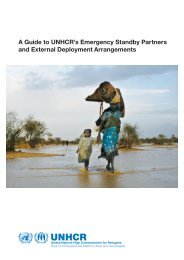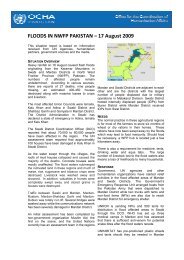Women, Girls, Boys and men - HumanitarianInfo.org
Women, Girls, Boys and men - HumanitarianInfo.org
Women, Girls, Boys and men - HumanitarianInfo.org
Create successful ePaper yourself
Turn your PDF publications into a flip-book with our unique Google optimized e-Paper software.
the mAIn messAge<br />
Gender analysis allows you to underst<strong>and</strong> who in the population<br />
is affected by the crisis; what they need; <strong>and</strong> what they can do for<br />
themselves. thinking about the gender di<strong>men</strong>sions of your work<br />
improves what you do, how you do it <strong>and</strong> what effect you have.<br />
It is simply about good programming<br />
Ask the questions: When conducting your assess<strong>men</strong>t<br />
always ask questions with a view to underst<strong>and</strong>ing the<br />
possible differences in experience for wo<strong>men</strong>, girls, boys<br />
<strong>and</strong> <strong>men</strong>.<br />
Put wo<strong>men</strong>, girls, boys <strong>and</strong> <strong>men</strong> at the centre of your<br />
assess<strong>men</strong>t: Gender analysis starts with the smallest<br />
units — the households — to underst<strong>and</strong> how each family<br />
member participates, what role they play <strong>and</strong> what<br />
they need in order to improve their well-being, security<br />
<strong>and</strong> dignity. For example, what factors affect access to<br />
services? Is there a difference between female/male consumption<br />
of food within families? Who obtains resources?<br />
Who decides on the use of resources? Insight into these<br />
dynamics can help ensure that assistance is channelled<br />
through the most effective means.<br />
Underst<strong>and</strong> the cultural context: Gender analysis also<br />
provides insight into cultural underst<strong>and</strong>ings of roles. For<br />
example, notions of “head of household” can vary. Often<br />
being a widow or a single mother has serious implications<br />
in terms of access to goods <strong>and</strong> services. In some<br />
instances male family members may want to assert control.<br />
The analysis of relations <strong>and</strong> roles can help identify<br />
vulnerabilities, potentials for backlash <strong>and</strong> also solutions<br />
to critical issues.<br />
Coordinate <strong>and</strong> cooperate: Effective gender analysis in<br />
the context of a crisis requires field workers in every sector<br />
or area of activity to ask whether <strong>and</strong> how the situation<br />
affects wo<strong>men</strong> <strong>and</strong> <strong>men</strong> differently. Additionally, field<br />
workers must ascertain how their programmes will address<br />
the immediate practical <strong>and</strong> longer-term strategic<br />
needs of wo<strong>men</strong> <strong>and</strong> <strong>men</strong>. It is also essential that different<br />
humanitarian actors communicate <strong>and</strong> share information<br />
with each other about gender differences, to ensure that<br />
programmes are well coordinated.<br />
genDer AnAlysIs: mAIn poInts<br />
1. always ask about the differences between wo<strong>men</strong>’s <strong>and</strong><br />
<strong>men</strong>’s experiences.<br />
2. undertake participatory assess<strong>men</strong>t with wo<strong>men</strong>, girls, boys<br />
<strong>and</strong> <strong>men</strong> together <strong>and</strong> separately.<br />
3. use the information to guide your programmes.<br />
I A s c g e n D e r h A n D b o o k<br />
Don’t make assumptions: Gender analysis helps explain<br />
the different ways wo<strong>men</strong>, girls, boys <strong>and</strong> <strong>men</strong> are affected<br />
by or participate in the political, economic, social <strong>and</strong><br />
cultural decisions made in a society. Being aware of who<br />
is making the decisions helps to ensure a more accurate<br />
underst<strong>and</strong>ing of the situation <strong>and</strong> the varying needs of<br />
different groups affected by the crisis.<br />
Don’t reinvent the wheel: There are plenty of resources<br />
inside <strong>and</strong> outside the humanitarian community to help<br />
you underst<strong>and</strong> the gender di<strong>men</strong>sions of any situation.<br />
Read up! Make sure you have the right docu<strong>men</strong>ts. Contact<br />
the experts. Make sure that you do not plan your programme<br />
on an incorrect or incomplete gender analysis.<br />
Consult with the entire affected population: Systematic<br />
dialogue with wo<strong>men</strong>, girls, boys <strong>and</strong> <strong>men</strong> — both separately<br />
<strong>and</strong> in mixed groups — is funda<strong>men</strong>tal to good humanitarian<br />
programming. In some cultures <strong>men</strong> will not<br />
speak about certain issues in front of wo<strong>men</strong> <strong>and</strong> vice versa.<br />
<strong>Wo<strong>men</strong></strong> may defer to <strong>men</strong> in terms of defining priorities.<br />
In wo<strong>men</strong>-only groups, wo<strong>men</strong> may be more willing<br />
to address how best to approach <strong>men</strong> so that there is no<br />
backlash against wo<strong>men</strong>’s increased activism. Adolescent<br />
girls <strong>and</strong> boys may have different ideas as well as needs<br />
that will not be captured if you only consult adults.<br />
who Are representAtIve leADers?<br />
in darfur, the humanitarian community consulted local<br />
leaders as partners in the distribution of food <strong>and</strong> goods. the<br />
assumption was that as leaders they had a constituency. yet<br />
the lack of gender analysis resulted in a disregard for existing<br />
leadership among wo<strong>men</strong>. over time the distribution system<br />
was abused by some male leaders <strong>and</strong> contributed to silencing<br />
wo<strong>men</strong>’s voices even more.<br />
Analysis to action: Use the information you gather to inform<br />
your programmes. This may at times mean significant<br />
changes or reallocation of resources — that’s OK, so<br />
long as it makes your programme more targeted to the<br />
needs of the wo<strong>men</strong>, girls, boys <strong>and</strong> <strong>men</strong> affected by the<br />
crisis. Too often we resolve the difficulties by adding a single,<br />
“feel good” project. Typically, though, you will need to<br />
integrate gender into your major programmes <strong>and</strong> have<br />
specific initiatives targeting particular populations, for example<br />
widows or young <strong>men</strong>.<br />
Assess <strong>and</strong> adjust: The situation on the ground changes<br />
constantly, as do people’s protection risks <strong>and</strong> needs.<br />
Through regular consultations using participatory approaches<br />
with the people affected by the crisis, you will<br />
find out if your programming is working. Adjust your programming<br />
to meet the needs of the people.<br />
T H e b A S I C S o n G e n d e R I n e m e R G e n C I e S<br />
BASicS











